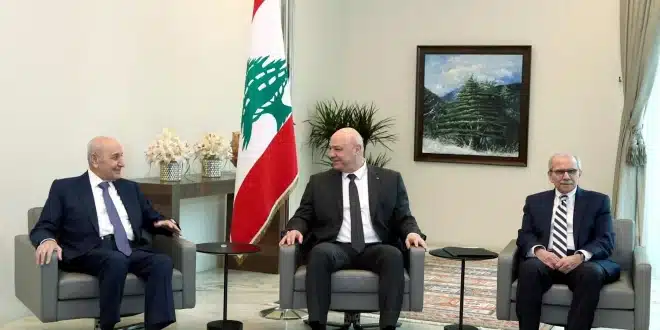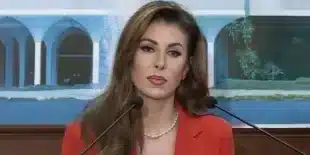A senior U.S. official said on Friday that Hezbollah’s involvement in Lebanon’s new government is a red line for Washington, while he described the Iran-backed group as “defeated” in its conflict with Israel, in an interview during a visit to Beirut.
Ortagus’ visit comes as Prime Minister-designate Nawaf Salam faces ongoing challenges in forming a government amid intense political pressure from powerful factions seeking control over ministerial positions. Lebanon’s political structure is based on a sectarian power-sharing model where key positions are divided among Christian, Shiite, Druze, and Sunni factions.
The Shiites are dominated by the Hezbollah-Amal alliance, while Christian influence is divided between the Lebanese Forces and the FPM. All of them are trying to get their hands on a certain ministry. With Lebanon struggling to recover from a prolonged economic crisis and the destruction caused by conflict, securing international financial support has become paramount. Ortagus underscored how the United States has drawn lines in the sand: Hezbollah cannot intimidate the Lebanese people by holding a role in governance.
Following a meeting with President Joseph Aoun-who long had been Washington’s favored ruler of Lebanon-Ortagus repeated that Hezbollah should be excluded from political power. To that, however, the Lebanese presidency quickly responded on X that her comments reflected personal opinions and the presidency wasn’t obliged toward them.
Over a year of hostilities has weakened Hezbollah, paving the way for Lebanon’s long-stalled parliament to finally elect Aoun as president and approve Salam as prime minister after more than two years of political deadlock. The military actions of Israel have significantly reduced Hezbollah’s leadership and operational strength, including reportedly reeling in the group’s longtime leader, Sayyed Hassan Nasrallah. Added to that is the loss of Syrian ally Bashar al-Assad, which has disrupted Hezbollah’s supply routes of weapons.
Ortagus praised Israel for its military effort, stating that Hezbollah’s defeat had started and its “reign of terror” in Lebanon and beyond was over. She said that Washington also hopes the new government will place high on its agenda anti-corruption measures, removing Hezbollah’s influence, and carry out reforms to stabilize the country.
It was a raft of reforms the international community had been using as leverage Lebanon must undertake to unlock much-needed financial aid following a deep economic collapse that began in 2019, which was widely blamed on corruption and mismanagement.
Salam, who is trying to form a new government, announced earlier in the week that his administration would not include political party members or any individuals who plan to run in parliamentary elections. The move demonstrates the broad Lebanese view that the traditional political parties are steeped in corruption.
Salam also signaled that he would not tolerate any ministers in his cabinet blocking government work.
But Hezbollah and its main Shiite partner, Amal, have insisted on pre-approving any Shiite ministers who enter the cabinet, which Salam has refused. Lebanon’s sectarian system of government frequently produces political deadlocks, as parties use influence to veto the formation of government. The same happened over the presidency before Aoun’s eventual election, in a period when the country didn’t have a president for two years. As Lebanon works through internal political disputes, the issue of the withdrawal of Israel from Lebanese territory remains atop the agenda.
Salam has committed himself to enacting reforms and rebuilding the country while making sure that a U.N. resolution calling for the withdrawal of Israeli forces from Lebanese territory will be implemented. Following his talks with Ortagus, Aoun said the consultations for the finalizing a new government are almost over, adding he pressed Israel to implement the agreed upon withdrawal within the set timeframe as the Lebanese Army is ready to deploy in towns and villages, which would become clear when withdrawal takes place.
The ceasefire agreement, brokered by Washington on November 27, ended more than a year of conflict including two months of fierce fighting between Israel and Hezbollah.
Under the deal, the Lebanese military was to take control of the south alongside U.N.
peacekeepers while Israeli forces completed their withdrawal within 60 days. At the same time, Hezbollah had to withdraw its forces north of the Litani River-about 30 kilometers from the border-and dismantle the remaining military infrastructure in the south. The initial pull-out date had been put at January 26 but was shifted back to February 18 following mutual accusations between both parties over ceasefire breaches.
Certain numbers of Israeli troops still stay in some locations, but Ortagus confirmed that the U.S. commitment remains complete towards making sure a completion by the new deadline.


